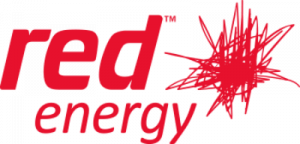Compare Electricity Plans and Providers
Looking for a cheaper power plan that’ll still suit your home energy usage and habits? We compare plans from a large range of electricity providers to help you find the right match.
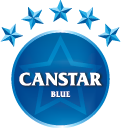
Start with your postcode
to compare 1,500+ Canstar Blue expert rated plans
-
Ongoing plan with no renewal required Glossary
-
No lock-in contract with variable rates Glossary
-
Ongoing plan with no renewal required Glossary
-
No lock-in contract with variable rates Glossary
-
Ongoing plan with no renewal required Glossary
-
No lock-in contract with variable rates Glossary
-
Ongoing plan with no renewal required Glossary
-
No lock-in contract with variable rates Glossary
-
12 month plan with no exit fees Glossary
-
No lock-in contract with variable rates Glossary
-
Ongoing plan with no renewal required Glossary
-
No lock-in contract with variable rates Glossary
-
Ongoing plan with no renewal required Glossary
-
No lock-in contract with variable rates Glossary
-
Ongoing plan with no renewal required Glossary
-
No lock-in contract with variable rates Glossary
-
Ongoing plan with no renewal required Glossary
-
No lock-in contract with variable rates Glossary
-
Ongoing plan with no renewal required Glossary
-
No lock-in contract with variable rates Glossary
-
12 month plan with no exit fees Glossary
-
No lock-in contract with variable rates Glossary
Showing 10 of 63 results
Unsure of a term in the above table? View glossary
The initial results in the table above are sorted by Value Rank out of 10 (High-Low) , then Price/year (estimated) including conditional discount (Low-High) , then Brand Satisfaction (High-Low) . Additional filters may have been applied, which impact the results displayed in the table - filters can be applied or removed at any time.
Latest in electricity
Sally Tindall’s guide to comparing electricity plans
Electricity tips from our expert
Shop around and compare energy providers
Don’t be a sitting duck when it comes to your energy provider. Shop around and switch providers when one is willing to offer you a better deal. Electricity prices can and do change regularly so make it a twice-yearly check. Remember – once you’ve found a new provider, switching can often be as simple as filling out a form.
Dial back your electricity usage and dial up your savings
Small changes around the home can help reduce your electricity use and potentially lead to big savings. Opt for energy-efficient appliances, put lids on your pots to speed up the cooking time, wash your bulkier items on sunny days and unplug your appliances when you’re not using them. While each step might feel insignificant in isolation, if you build them into your daily routine they can make a difference.
Invest in solar energy
Consider investing in solar panels. While the upfront cost might seem daunting, the long-term savings can make it a worthwhile investment, particularly if you know you’re likely to live in the same house in the long term.
Find the cheapest electricity prices available
Every Aussie household dreams of paying less for power. But, how do you go about finding the best possible price for your energy bill? While the final figure is a great place to start, it’s also important to consider your usage and supply charges, as these ultimately decide what you’ll fork out come the due date.
To see compare electricity plans and find the cheapest electricity prices available in your area, check out our guides below.
Cheapest electricity prices
Canstar Blue’s energy experts select the top three cheapest plans available in each state right now, as well as the cheapest variable rate, fixed rate, discounted and no discount electricity plans.
Best value electricity plans
Using our unique Value Rank, these guides reveal the plans with the best score that offer fixed rates, variable rates, value-add incentives or no conditions. We also show the overall highest scoring plan in each state.
Compare the best electricity providers
You’ve got a price, you’ve got a plan type, but have you chosen a retailer that’s got what it takes to provide you with great customer service? That’s where our expert, consumer-led research comes in. We list all our current award winners below to help you compare the providers currently rated best in the biz in a range of areas.
Most Satisfied Customers Awards
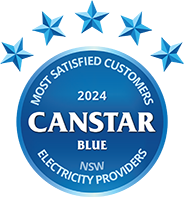
Each year at Canstar Blue, we release our annual satisfaction ratings for electricity providers in New South Wales, Victoria, South Australia and Queensland. In these reports, providers are ranked based on value for money, customer service, bill & cost clarity, ease of sign-up, focus on environmental sustainability, online tools and advice and overall satisfaction. Our recent winners included:
- Best-Rated Electricity Provider NSW: Red Energy (2024)
- Best-Rated Electricity Provider in VIC: Lumo Energy (2024)
- Best-Rated Electricity Provider in QLD: Red Energy (2024)
- Best-Rated Electricity Provider in SA: Lumo Energy (2024)
- Best-Rated Dual Fuel Provider Nationally: Lumo Energy (2025)
- Best-Rated Solar Energy Provider Nationally: Lumo Energy (2025)
- Best-Rated Small Business Electricity Provider Nationally: Red Energy (2024)
Outstanding Value Awards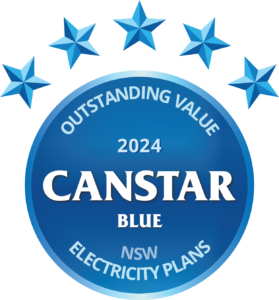
Canstar Blue’s Outstanding Value Awards are based on our unique value rank methodology and highlights the electricity providers that offer superior prices, value and features for consumers in each eligible state or territory.
Our 2024 winners for electricity plans included Powershop (NSW, QLD), Tango Energy (VIC), Pacific Blue (SA), Origin Energy (ACT) and 1st Energy (TAS).
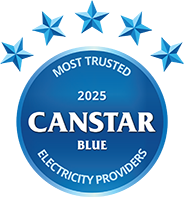
Most Trusted Electricity Provider
In addition to determining which electricity provider has the most satisfied customers in eligible states, Canstar Blue also uses this data to determine the electricity provider that is most trusted by Aussie consumers. This is collated by asking consumers to rate their level of trust in their electricity provider on a scale of one to 10.
From our 2025 results, Tango Energy emerged as the clear winner.
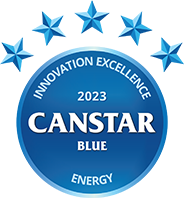
Innovation Excellence Awards
Canstar Blue’s Innovation Excellence Awards acknowledge products or services from energy companies that think outside the box when it comes to benefiting Aussie consumers.
In 2023, we awarded SENEC for its SENEC.Cloud virtual solar storage package for home battery systems.
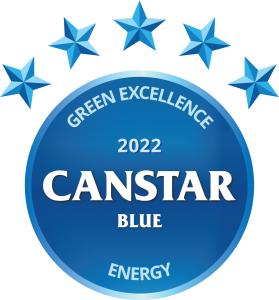
Green Excellence Awards
Canstar Blue also acknowledges products, initiatives and services from electricity providers that help consumers to live more sustainably. These are recognised through our Green Excellence Awards.
Our 2022 awards winners included Energy Locals, Enova Energy, Momentum Energy and Nectr.
Please note, Enova Energy entered voluntary administration in June 2022.
Compare electricity plans from the big three providers
- No exit fees
- Carbon offset and GreenPower options
- Discounts for bundling with internet
- Access to AGL Rewards
- Regular sign-up incentives

- Guaranteed discounts
- GreenPower options
- 12-month benefit periods
- No exit fees
- Solar options

- Variable rate offers
- Carbon offset and GreenPower options
- Access to Everyday Rewards Points
- Discounts for bundling with internet
- 12-month benefit periods
Compare electricity plans from other popular providers
Remember, bigger isn’t always better. And while there are plenty of big electricity companies, which have a large portion of the market share, there are also several other, smaller energy providers to choose from. Always be sure to compare offers from a range of providers, both big and small before making a purchase decision.
- Fixed and variable rate offers
- Sign-up incentives such as Qantas Points or Zoo memberships depending on location
- GreenPower options available
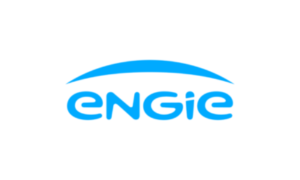
- Carbon offset and GreenPower options
- Special discounts and plans for NRMA and RAA members
- No exit fees
Why compare electricity plans with Canstar Blue?
Easy to compare
Compare electricity plans from some of the biggest providers across Australia to help you find the best value for money
100% free to use
Our electricity comparison service is completely free to use. Plus, we’ll never ask for your phone number
Switch with confidence
We include a ‘value score’ that ranks electricity plans based on other value-add features in addition to price. Learn more
FAQs about electricity
About our energy experts
 Tara Donnelly, Utilities Editor
Tara Donnelly, Utilities Editor
Tara Donnelly is Canstar Blue’s Utilities Editor, leading the team that focuses on energy, telecommunications and consumer technology, across news, reviews and how-tos. Tara has spent more than a decade covering these topics in Australia, the US and Canada, which means she’s written about countless product launches and industry changes, including the onset of 5G, Australia’s ongoing NBN rollout, the recent years of energy price volatility and the rise of renewable energy sources.
Tara also has long experience in writing within the comparison industry, giving her great insights into the information consumers want when determining which plan or device will best meet their needs, while time spent in the financial sector before turning her talent to content lets her crunch the numbers on price with ease. Tara leads the coverage of Canstar Blue’s ratings and awards for the internet and phone sectors and is an expert at advising consumers on how to use comparison tools to find the best power, internet or phone deal.
Her expertise has seen her appear in national media including 9 News, 7 News, Sunrise, the ABC, The New Daily and The Sydney Morning Herald.
Meet the Editorial Team Breanna Gream, Data Insights Team Lead
Breanna Gream, Data Insights Team Lead
Bachelor of Business (Finance) with Distinction & Bachelor of Mathematics (Applied Computational Modelling) with Distinction, QUT
Breanna Gream is Canstar’s Data Insights Team Lead, responsible for developing the methodology and delivering Canstar Blue’s Value Ranking and determining Outstanding Value award winners for the energy and telecommunications sectors. Breanna completed a double Bachelor’s degree in Business, majoring in Finance, and Mathematics, majoring in Applied Computational Modelling, at the Queensland University of Technology.
Breanna enjoys using her skills to help consumers find more suitable utilities plans by transforming complex calculations into a Value Rank that provides a simpler way to compare different products. She most recently developed Value Ranking methodologies for wireless broadband plans and solar energy plans, to make it easier for households to identify plans that provide good value not just in terms of prices but also the features they offer. Breanna’s work on Value Ranking plays a key part in determining the winners of Canstar Blue’s Outstanding Value awards for electricity, gas, solar, phone and internet brands.
Many of the articles published by Canstar Blue feature calculations also undertaken by Breanna and her team, which converts pricing data into easy-to-understand cost forecasts and average price information for readers.
During her time at Canstar Blue, Breanna has developed an in-depth knowledge of product, market and regulatory changes across the electricity, solar, gas, internet and phone sectors, and particularly likes keeping Canstar Blue’s methodologies up to date and reflective of the ever-changing utilities environment.
When Breanna’s not crunching data, she’s likely to be somewhere remote – two of her favourite things to do are hiking and mountain climbing.
Meet the Research TeamImportant information
For those that love the detail
This advice is general and has not taken into account your objectives, financial situation or needs. Consider whether this advice is right for you.















































